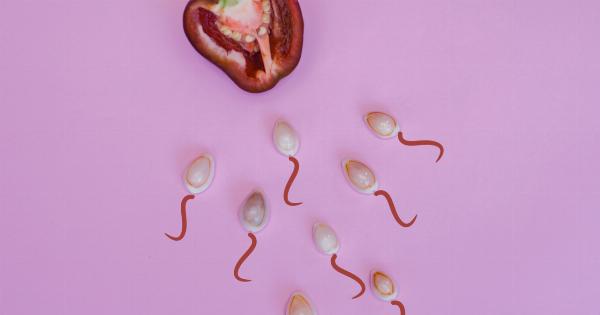Male orgasm is the peak of sexual pleasure for men. It is a physiological process that releases tension and provides a feeling of euphoria. However, orgasm also has strange and unusual effects on the male body.
In this article, we will explore some of these effects and understand the phenomena behind them.
1. Post-Orgasmic Illness Syndrome (POIS)
POIS is a rare condition that affects men and is characterized by various symptoms that occur immediately after ejaculation. These symptoms may include fatigue, flu-like symptoms, headaches, and fever.
Although the exact cause of POIS is unknown, some researchers suggest that it may be due to an autoimmune reaction to proteins present in semen.
2. Retrograde Ejaculation
Retrograde ejaculation is a condition where semen is not ejected through the penis during orgasm. Instead, it goes into the bladder and is expelled during urination.
This condition is usually caused by damage to the nerves or muscles that control the bladder sphincter. Although retrograde ejaculation does not affect sexual pleasure, it can cause infertility as the sperm cannot reach the female partner.
3. Augmentative Role of Oxytocin
Oxytocin is a hormone released during orgasm that plays a crucial role in human social behavior and bonding. It is also known as the ‘love hormone’ as it promotes feelings of trust and intimacy.
Some studies suggest that oxytocin may also have an augmentative role in sexual behavior by enhancing sexual desire, arousal, and pleasure.
4. Phantom Orgasm
Phantom orgasm is a rare condition where a man experiences an orgasm without any physical stimulation. This condition is similar to phantom limb pain, where a person feels pain in a missing limb.
Although the exact cause of phantom orgasm is unknown, some researchers suggest that it may be due to abnormal brain activity or psychological factors.
5. Ejaculatory Inevitability
Ejaculatory inevitability is the point of no return during sexual activity, where ejaculation cannot be stopped or delayed. This phenomenon is due to the involuntariness of the ejaculatory reflex and the buildup of sexual tension during arousal.
Ejaculatory inevitability can be delayed by various techniques such as the start-stop method, but ultimately, it is a physiological process that cannot be controlled voluntarily.
6. Sexual Headaches
Sexual headaches are a rare type of headache that occurs during sexual activity or orgasm. The pain is usually throbbing, intense, and located at the back of the head or neck.
Although the exact cause of sexual headaches is unknown, some researchers suggest that it may be due to the sudden increase in blood pressure during sexual activity. Sexual headaches can be treated with pain medications or prophylactic medications.
7. Post-Orgasmic Suppression of Dorsolateral Prefrontal Cortex
The dorsolateral prefrontal cortex is a brain region responsible for cognitive control, decision-making, and inhibition.
Some studies suggest that this brain region is suppressed during orgasm, leading to a reduced sense of self-awareness and inhibition. This phenomenon may explain why some people engage in risky sexual behavior or make impulsive decisions during sexual arousal.
8. Persistent Genital Arousal Disorder
Persistent genital arousal disorder is a rare condition where a person experiences persistent and uncontrollable sexual arousal that is not relieved by orgasm. This condition can cause discomfort, embarrassment, and even depression.
Although the exact cause of persistent genital arousal disorder is unknown, some researchers suggest that it may be due to an abnormality in the nerves or blood vessels of the genital area.
9. Sexual Exhaustion
Sexual exhaustion is a phenomenon where a person experiences a decrease in sexual desire and a decline in sexual performance after repeated sexual activity.
This condition is thought to be due to the depletion of certain neurotransmitters and hormones that are involved in sexual function. Sexual exhaustion can be treated by taking a break from sexual activity or by using medication that enhances sexual function.
10. Post-Orgasmic Refractory Period
Post-orgasmic refractory period is the period of time after orgasm where a person is unable to achieve another orgasm. This period can last from a few minutes to several hours, depending on the individual’s age, health, and sexual activity.
The refractory period is thought to be due to the depletion of neurotransmitters and hormones involved in sexual function, as well as the need for the body to recover from the physical and emotional effects of orgasm.






























